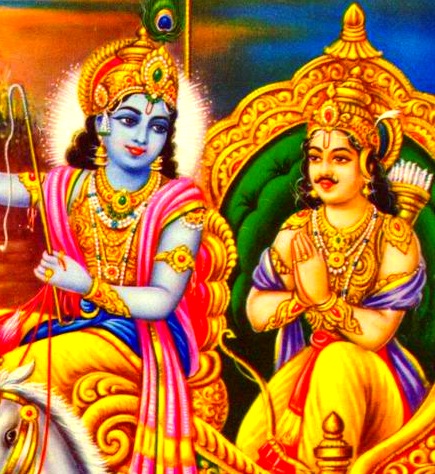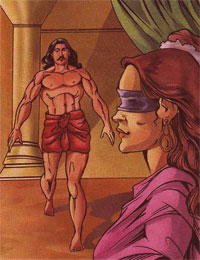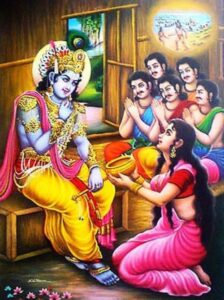Sri Krishna and Arjuna’s Visit to the Widow
The Widow’s Devotion
Sri Krishna and Arjuna once visited a widow. She had no children and was all alone, but she owned a cow. This cow was her only means of support, as she sold its milk to sustain herself. Despite her circumstances, she was a great devotee of Sri Krishna.
Hosting Divine Guests
When Sri Krishna and Arjuna visited her incognito, the widow was overjoyed. She welcomed them and fed them with whatever little she had in her house. Sri Krishna was extremely pleased with her surrendering attitude and devotion.
Arjuna’s Question
On their way back, Arjuna questioned Krishna, “You were so pleased with her. Why didn’t you grant her a boon? Why didn’t you tell her that she would soon prosper?”
Krishna’s Reply
Krishna responded, “I have already granted her a boon that her cow must die tomorrow.”
Arjuna’s Shock
Arjuna was shocked. “Her only means of support? Without the cow, how can she live?”
Krishna’s Explanation
Krishna explained, “You don’t understand, Arjuna. She always thinks of the cow—feeding it, milking it, bathing it. I want her to think only of Me. When the cow is gone, she will think of Me all the time. Then, when the time is right, I will take her from this world and give her a better and more fulfilling incarnation. With no one left on earth, not even the cow, she will devote all her time to Me.”
Moral of the Story
Sri Krishna’s ways are inscrutable. Sometimes, when we are in great difficulty, the Grace of God acts in peculiar ways. We may feel that God becomes more cruel when we are suffering, but we do not understand His hidden plans.
In the Srimad Bhagavatam 10.14.8, Brahmaji says:
tat te ’nukampāṁ su-samīkṣamāṇo
bhuñjāna evātma-kṛtaṁ vipākam
hṛd-vāg-vapurbhir vidadhan namas te
jīveta yo mukti-pade sa dāya-bhāk
“My dear Lord, one who earnestly waits for You to bestow Your causeless mercy upon him, all the while patiently suffering the reactions of his past misdeeds and offering You respectful obeisances with his heart, words, and body, is surely eligible for liberation, for it has become his rightful claim.”
Purport
Śrīla Śrīdhara Svāmī explains that just as a legitimate son has to simply remain alive to gain an inheritance from his father, one who remains alive in Kṛṣṇa consciousness, following the regulative principles of bhakti-yoga, automatically becomes eligible to receive the mercy of the Personality of Godhead.
A devotee earnestly awaits the mercy of the Supreme Lord even while suffering the painful effects of previous sinful activities. Though a devotee who fully surrenders unto Him is no longer liable to suffer the reactions of his previous karma, the Lord may give punishments resembling sinful reactions to remove the last vestiges of the enjoying spirit.
This unhappiness is not technically a karmic reaction but rather the Lord’s special mercy to induce His devotee to let go of the material world and return home, back to Godhead. A sincere devotee accepts the Lord’s merciful punishment and continues to offer respects and obeisances, ultimately becoming a legitimate son of God.
Just as one cannot approach the sun without becoming fire, one cannot approach the supreme pure, Lord Kṛṣṇa, without undergoing a purificatory process, which may appear like suffering but is a curative treatment administered by the personal hand of the Lord.



